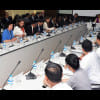IPU call for UNSC intervention

The Inter-Parliamentary Union has delivered a strong condemnation of the atrocities committed by Myanmar in Rakhine State, adding its voice to the growing call for actions by the global powers. The global parliamentary community, in a resolution that echoed Prime Minister Sheikh Hasina's five-point peace plan, called for concrete steps from the United Nations Security Council—including creation of "safe zones" inside Myanmar—to put an end to the ethnic cleansing of the Rohingya community. The statement lends further weight to the belief that this crisis may not stop without a stronger intervention by the UNSC permanent members and other strategically important countries.
Since the persecution began in Rakhine in late August, nearly 600,000 Rohingyas have crossed into Bangladesh. Witness accounts, satellite imagery, and photo and video evidence gathered by different agencies including the UN, show how a country used its geo-economic advantage to preside over one of the worst and fastest growing humanitarian crises in history. It is frustrating to see that many countries, despite holding Myanmar's military leadership responsible for this situation, have failed to come up with an action plan. China and India continue to turn a blind eye, emboldening Myanmar to renege on its commitment to restore peace. If the fresh influx of refugees is any indication, token measures and perfunctory condemnations are not going to work any longer.
What is needed is concrete action to ensure that Myanmar immediately stops its bloody crackdown. A sustainable return of the displaced Rohingya people to their homeland is also a priority, and for that to happen, the UNSC should use any means necessary to make the country grant citizenship and all other rights to these people, including access to the labour market, education, health and social services.

 For all latest news, follow The Daily Star's Google News channel.
For all latest news, follow The Daily Star's Google News channel. 








Comments